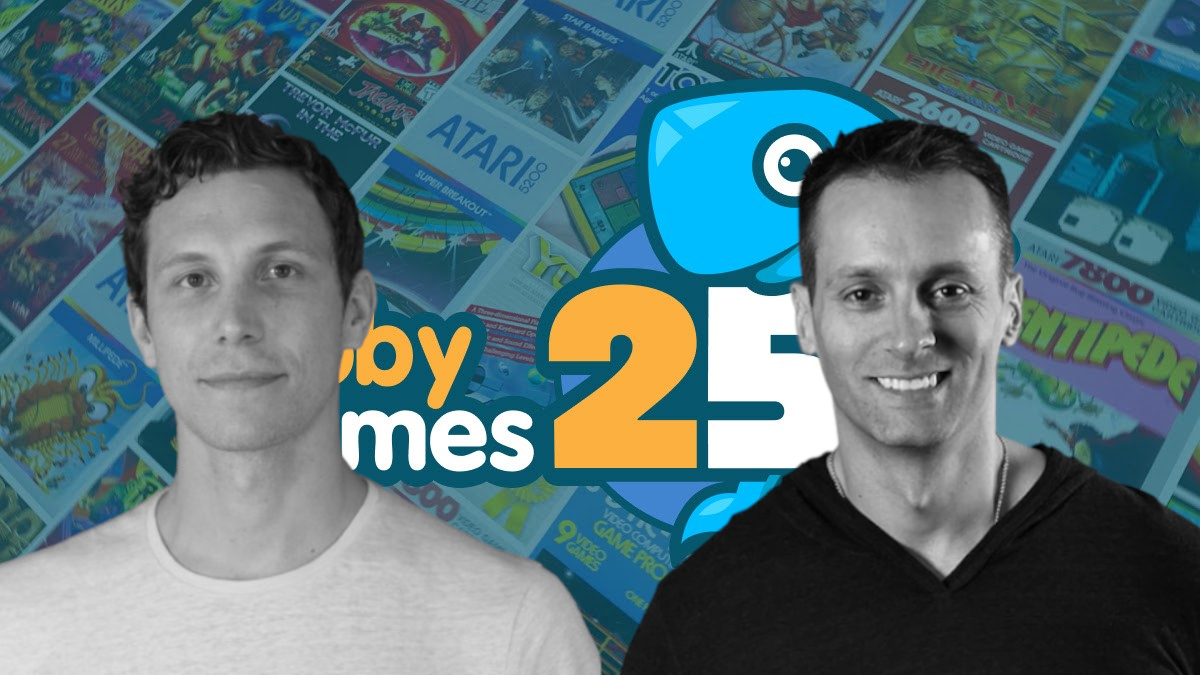We need sites like MobyGames now more than ever. With the ongoing enshittification of the internet, where useful and trustworthy information is being buried under a mountain of worthless garbage, user-driven databases are becoming the last reliable, trustworthy sources. How standards have changed.
It’s been 25 years since MobyGames was founded. However, its future was never guaranteed. In fact, I’m not sure I recall a time when it wasn’t at risk of disintegrating. But roughly two years ago, in 2022, the website landed in the hands of Atari. At the time, I thought that was another twist in a series of bad turns, but now, I’m not sure that’s the case.
I was given the chance to speak with Atari CEO Wade Rosen and the general manager Jeremiah Freyholtz about the state and future of the site, which is something I couldn’t pass up given my history with it.
I joined the MobyGames community in 2009. While I made some small contributions to the database, my main reason for joining was to cut my teeth writing about video games. What I did there 15 years ago led me here. Users are able to submit reviews for any game listed on the site, so that’s how I taught myself to be a critic. All my reviews are still up there, including the first I ever wrote, and it’s awful. I keep it up to show how much I’ve developed my craft, but I’m not going to link you to it out of shame.
More importantly, however, I connected with the community there. At the time, the forums were an active place just for talking about video games. Just a bunch of people who loved video games from all eras, all who had very particular and eclectic tastes. I fit right in.
In 2010, the founders of the site sold it to GameFly Media, and the results were catastrophic. It was done without informing anyone in the community. One day, there was just a GameFly logo at the bottom of the screen. Some longtime approvers and contributors resigned immediately. Even the most optimistic, however, quickly lost faith when the company rolled out an updated look for the site sometime in 2013.
The original look of MobyGames was aging fast, but the new version was broken and unusable. The remaining community crumbled. The forum conversations dried up. Even I left after it felt like there was nothing for me there anymore.
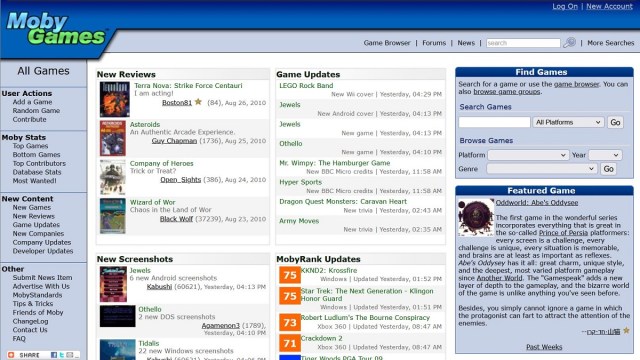
One day at the end of December 2013, one of the community members messaged me over Steam. The old site was back. Suddenly, and out of nowhere. It was a gosh-darned Christmas Miracle.
GameFly had sold the site to Jeremiah Freyholtz (who we knew as Reed at the time) and Simon Carless of Blue Flame Labs. They had rolled everything back. More importantly, they were planning to do the work to help restore MobyGames.
The community, having been so badly burned by the Gamefly deal, was skeptical. Work was beginning on Blue Flame’s own refresh on the site, and while Reed was communicating and taking the community’s feedback into consideration, it would never be possible to please so many passionate people. In retrospect, Blue Flame saved MobyGames. At least from my perspective.
Unfortunately, the community would never quite be the same. Don’t get me wrong; a good many of the people who I used to converse with in the forums are still there, and a lot of people still contribute to the site. But the random talk about video games in general and their history never really came back. That probably moved to the Discord server, as is often the case these days.
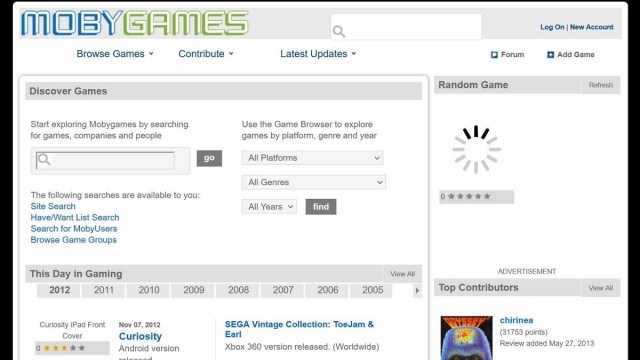
However, the updates slowed down pretty quickly. In 2014, Simon Carless clarified that MobyGames didn’t make much revenue. This meant that Freyholtz had to focus on other things and couldn’t devote all his attention to the site. They brought on community member Tracy Poff to maintain things and fit in what upgrades they could.
I made regular donations to the site. I thought this was the primary, and I have no idea why because the site always had ads. Freyholtz told me, “Actually, for most of our history, the site was supported primarily by ads and affiliate links. Although we had donations at times, it was a smaller piece.”
Sometime in 2020, Antstream bought the site, but things remained very much the same. So much so that I didn’t even notice, and neither did much of the community. However, it did open up Atari’s entry.
According to Wade Rosen, “We made a strategic investment in Anstream back in late 2021, which owned Mobygames, and as part of that investment secured the option to buy Mobygames outright. We exercised that option in early 2022. MobyGames was something that I had identified pretty early on as something I thought made sense within the Atari family.”
“For me, Mobygames has always been the source of truth for information about video games,” Rosen said. “That has been particularly valuable to me in game publishing, first at Ziggurat and now at Atari.”
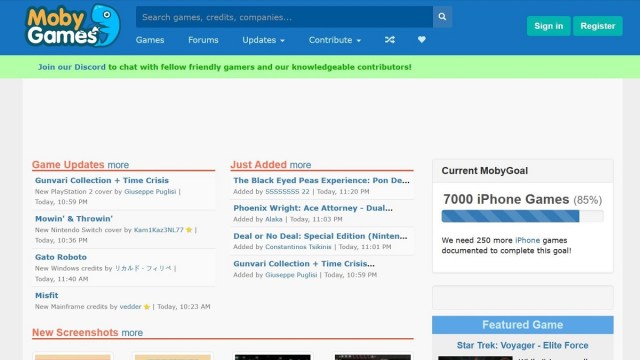
When it was announced in 2022, I thought Atari’s acquisition would just be a repeat of the GameFly situation. The Atari I knew up to that point was coasting on past success by occasionally releasing (very) substandard entries in older series. But since Rosen took over as CEO, the company has made strides in proving that game preservation is their business model. Now it doesn’t seem like such a bad fit.
Development on MobyGames went into overdrive. The site got another interface update, but beyond that, a number of additional features were added. One of the more interesting additions is still in beta, which is MobyPro, a paid subscription tier that provides improved analytics. Little changed for users who just want to access the database for free, but for people who commonly research games, like myself, it’s an appreciable addition.
“Originally, I wanted to do MobyPro about a decade ago,” Freyholtz explained, “but felt that it and the overall long term vision was untenable with the old backend from 1999. So instead, we put our efforts into first building a new site and infrastructure – effectively a new foundation from which to work from. Tracy Poff (the other developer at Moby) and I worked on that part-time, on and off, over the course of many years. Along with feedback from the approvers as we developed it. Ultimately Atari’s investment and support enabled us to get it over the finish line!
“It was a massive project and I’m relieved we made it to the other side,” he added. “Especially since the site and database is now in the best shape it’s ever been.”
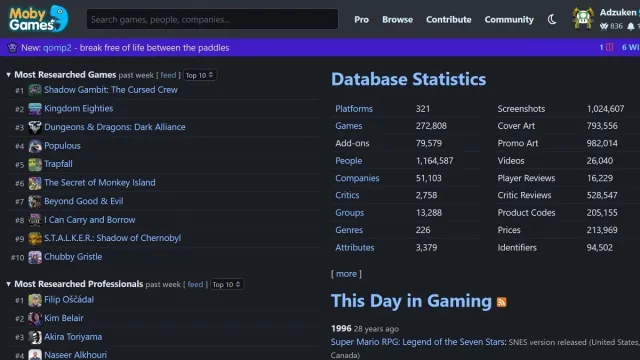
As for how the community responded, Freyholtz says, “The community has been energized by the rapid pace of development we’ve been able to achieve since the upgrade. Prior to that improvements and bug fixes took *forever*. And with MobyPro, it’s still very early days, but it’s off to a good start!”
I asked if contributions have picked up since the site’s update, and Freyholtz provided a graph to illustrate.
That is certainly a graph. We’re missing an axis here, but it definitely goes up.
Things are still in the midst of improvements, however. MobyPro is available, but it’s still in early access. The site is already in better shape than I’ve ever seen it, but I was curious about what other additions were planned, so I asked Freyholtz.
“Oh absolutely, there are many!” He replied. “And some have been added since launching the new site. A favorite of which is Game Relations. Which allows contributors to link games to any of its expansion packs, DLC, conversions, compilations or special editions.”
“But overall we’re focusing more on improving the UI and processes for our existing data types before expanding too much into other areas.”
Game relations, in particular, have been something requested by the community since the time I was active there. Things like expansion packs and DLC would be listed with their own entry in the database, and you’d typically need to look at the description to see what they related to. The game relations panel just shows it at a glance.
Speaking of community requests, I had to ask a cheeky question about whether or not the Famicom Disk System would become its own platform.
“As for Famicom, there are differing opinions about that (and some other platforms) in the community, and I’m not sure where we’ll land on that yet,” Freyholtz explained. “Currently we document it as a tech spec, which you can find here.”
Yes, this has long been argued about in the community, even as far back as when I was active. If it’s not clear, I’m on the side that thinks it should be a different category. After all, the Sega CD and Turbografx CD are listed as separate platforms.
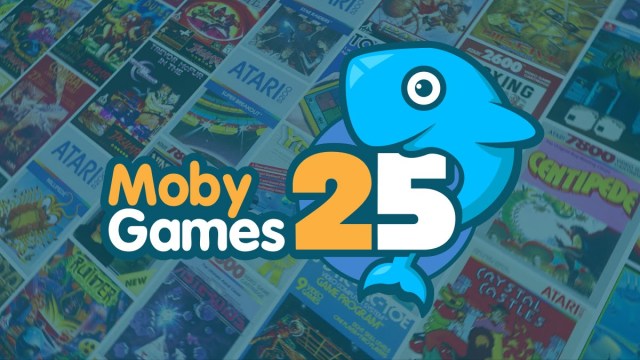
25 years is practically ancient on the internet. 1999 was even before the dotcom bubble burst and ended Web 1.0. To close out the interview, I asked both Rosen and Freyholtz what they think MobyGames will look like in 25 years.
For Wade Rosen, “I am excited to see the professional layer added to an already rich body of information and active community. As you look forward to how the site will document and discuss more modern games, it opens up a host of possibilities. It is hard to predict exactly what it will look like, but my expectation is that MobyGames will continue to excel at its core mission, and it will remain the most authoritative source for video game information.”
As for Jeremiah Freyholtz, “I think it will make the current MobyGames look like a baby in comparison, in terms of capabilities and scope of video game knowledge. And will be an increasingly important part of the industry.”
MobyGames has gone through some rough patches in the past, and there’s no guarantee that it won’t hit another. However, with Atari providing Jeremiah Freyholtz the ability to implement his vision for the site, things are looking more optimistic than ever. Here’s hoping that the new owners and, more importantly, the hard-working community volunteer contributors and approvers can keep this important resource going strong far into the future.
As Freyholtz puts it, “Check back on our 50th Anniversary!”

